Featured Publications
Publications
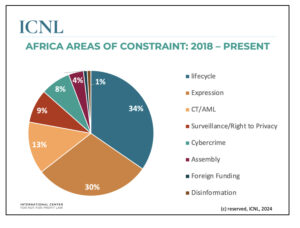
African CSOs Chart Paths to Counter Shrinking Civic Space
Rachel Ansley reports on the “PTF Africa Civil Society Forum on Shrinking Civic Space” that brought together CSO representatives from Gambia, Ghana, Guinea, Kenya, Malawi, Mali, Niger, Nigeria, Rwanda, Senegal, Togo, Uganda and Zambia, as well as regional organizations, at a time when civic space continues to shrink in Africa.
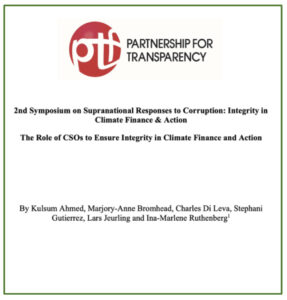
The Role of CSOs to Ensure Integrity in Climate Finance and Action
This paper for the Second Symposium on Supranational Responses to Corruption explores how partnerships with local CSOs could help advance integrity on climate finance and action.
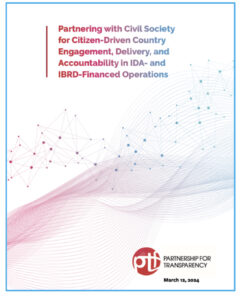
This report makes ten recommendations on how partnerships with citizens and civil society organizations can be deepened in IDA and IBRD engagement, financing, and accountability activities at the country level.
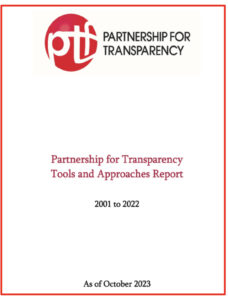
PTF Tools and Approaches Report – 2001 to 2022
This report is a reference document containing the tools and approaches that have been used by PTF, the Asia and Europe affiliates, and the Africa Committee over the last two decades in a multitude of countries.
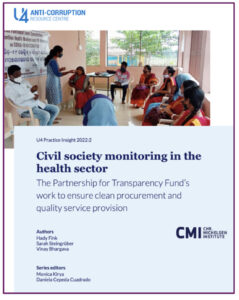
Civil Society Monitoring in the Health Sector
Hundreds of millions of people have to pay bribes when using public services. This situation has not improved for more than a decade. There is a strong case for rethinking the current anti-corruption approaches in which funding for anti-corruption and good governance programs is overwhelmingly allocated to government efforts (supply side) with relatively little given to non-state actors (demand side). Increasingly evidence has shown that civil society can make a meaningful difference in the furtherance of anti-corruption aims.
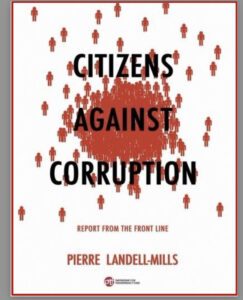
Citizens Against Corruption: Report from the Frontline
Over the last dozen years PTF has supported with money and expert advice more than 250 projects across the developing world to reduce corruption. Now, in a brand new book, Landell-Mills reviews the record: he highlights the civil society organizations that are making a real difference to secure basic human and civil rights for tens of thousands of poor people; he describes fascinating projects in Asia, Africa, Latin America and in Central & eastern Europe; and, he brings to the fore the key lessons that all engaged in the fight against corruption need to use to advance their work.
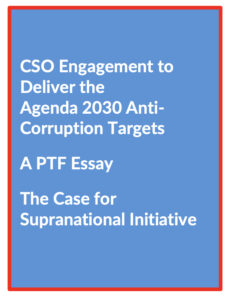
Hundreds of millions of people have to pay bribes when using public services. This situation has not improved for more than a decade. There is a strong case for rethinking the current anti-corruption approaches in which funding for anti-corruption and good governance programs is overwhelmingly allocated to government efforts (supply side) with relatively little given to non-state actors (demand side). Increasingly evidence has grown that civil society can make a meaningful difference in the furtherance of anti-corruption aims.
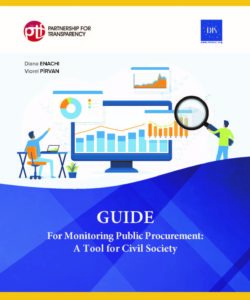
Guide for Monitoring Public Procurement: A Tool for Civil Society
By overseeing the manner in which public money is used, civil society can significantly contribute to strengthening governance and building bridges between society and public authorities at all levels. International experience has shown that CSOs can play an active and important role in the direct monitoring of public procurement, thus contributing to increased transparency at all stages of the procurement cycle. They can demand accountability when public contracting authorities fail to observe the principles of transparency, integrity, and efficiency in the procurement process or are part of corrupt schemes by referring cases of abuse to supervisory bodies and law enforcement entities. This guide, first developed for Moldova, but whose principles are applicable in other contexts, is intended to support CSOs, civic monitors, and investigative journalists in their monitoring of public procurement at all levels and in any domain.
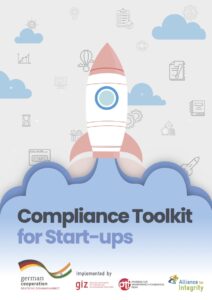
Compliance Toolkit for Start-Ups in India
In India, start-up businesses constitute a significant and active share of the economy. While development and growth are to be encouraged, they must also be regulated. The acceleration and expansion of start-ups are often hampered by internal and external challenges, including the lack of compliance with government regulations. This can be caused by lack of information among business owners, speed of scale-up, or other factors. However, in the face of this challenge, the Partnership for Transparency India (PTFI) has partnered with Alliance for Integrity and MSME Inno to develop a Compliance Toolkit for Start-ups.
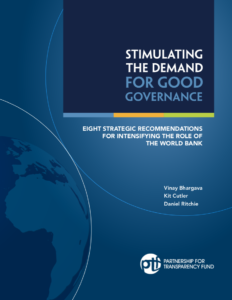
Stimulating Demand for Good Governance
This study focuses on the World Bank’s “Governance and Anti-Corruption” (GAC) policies. The report stresses that the Bank’s goal to significantly scale-up its work in the anti-corruption area with civil society organizations (CSOs) has been hampered by: its approaches that first seek host government executive branch consent; poor publicity by the Bank of opportunities for civil society to receive funding; CSO concerns that receiving funds from their governments will undermine their independence; and, “there is an inherent conflict of interest in a CSO accepting funds from a government agency or the World Bank and then engaging in independent monitoring of that same agency in a Bank-financed project.”
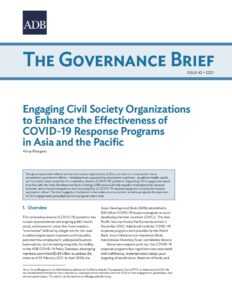
The Asian Development Bank (ADB) contracted the Partnership for Transparency to write a governance brief titled “Engaging Civil Society Organizations to Enhance the Effectiveness of COVID-19 Response Programs in Asia and the Pacific.” The brief, authored by Vinay Bhargava, PTF’s chief technical adviser, was published by the ADB in March 2021. Throughout the brief, Bhargava explains how civil society organizations (CSOs) can take on a more active role to complement government efforts to respond to COVID-19, particularly addressing not only the health crisis, but the social, and economic ramifications as well. The brief suggests a framework across six programmatic areas for formulating country-specific programs to facilitate the expansion of CSO engagement in pandemic response at the local government level.
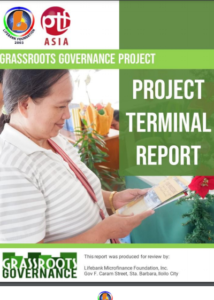
Grassroots Governance Project: Final Report
The Expanded Grassroots Governance project is a development or offshoot of an earlier project implemented by Bantay.ph in the Philippines in two pilot areas: Norzagaray, Bulacan and Bago City (Negros Occidental) in 2015-2016. The external evaluation of the project concluded that Bantay.ph was able to develop the Grassroots Governance initiative into an effective and replicable model of citizen participation in their local community. The final report reviews the project’s successes and summarizes key findings.
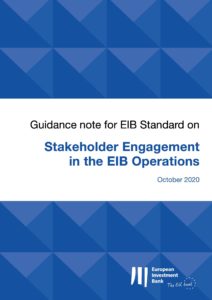
Guidance Note for EIB Standard on Stakeholder Engagement in EIB Operations
This EIB Guidance Note provides clear and compelling information on how best to ensure that development projects embrace all the key stakeholders, including the most vulnerable people, to secure meaningful benefits for their lives. It aims to enable civil society, project consultants, and others engaged in development to address the EIB’s primary concerns and policies relating to stakeholder engagement in the planning and the implementation of projects. It was prepared with the support of John Clark and Marie-Carin von Gumppenberg from PTF Europe, an affiliate of the US-headquartered Partnership for Transparency Fund.
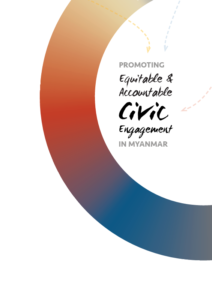
The PEACE Project: Promoting Equitable and Accountable Civil Engagement in Myanmar
Promoting Equitable and Accountable Civic Engagement in Myanmar (also known as the PEACE project) was a four-year project started in August 2016 and concluded in July 2020, which was implemented by a three-member consortium: HELVETAS Intercooperation gGmbH, the Local Resource Centre (LRC), and the Partnership for Transparency Fund e.V. (PTF e.v.). The European Union provided the co-funding. The PEACE project’s objective was to support the local civil society organisations’ (CSO) participation and influence in the planning, implementation and review of development projects, service delivery and policies at national and sub-national levels for more inclusive and equitable development in Myanmar. This is the project’s final report.
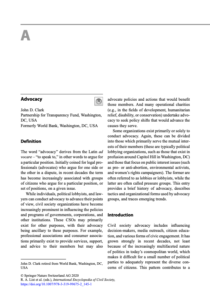
International Encyclopedia of Civil Society: Advocacy
This entry to the International Encyclopedia of Civil Society explores the reshaping of democracy as citizens’ concerns become increasingly global in nature and as traditional political parties are no longer the natural home for the issues people care about – after providing a brief history of advocacy; summarizing the tactics used by civil society; and describing the organizational forms that are typically found. It finishes by setting out three important emerging trends: (a) an increasing focus on “how” rather than “what” in CSO advocacy, with attention broadening from policies (whether governmental or corporate) to questions of governance, accountability, and inclusion; (b) the rapid diversification of approaches and organizational forms as the political landscape changes and modern information and communication technologies (ICT) open new avenues; and (c) the backlash against CSOs as their advocacy becomes more influential.
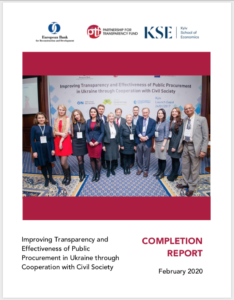
This report reviews the implementation experience and results of the project, Improving Transparency and Effectiveness of Public Procurement in Ukraine through Cooperation with Civil Society, co-funded by the European Bank for Reconstruction and Development (EBRD) and PTF. The Project was carried out by PTF from the fall of 2016 through November 2019. It focused on building the capacity of Ukrainian Civil Society Organizations (CSOs) to serve as independent monitors of public procurement procedures and processes, with the goal of enhancing the transparency and fairness of public procurement using in Ukraine.
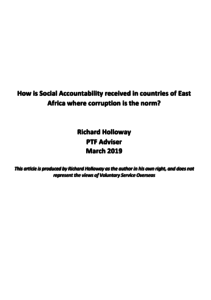
How is Social Accountability received in countries of East Africa where corruption is the norm?
The author (Richard Holloway) was responsible for training the field staff of a British NGO in the methodology of social accountability in 2018 in Kenya, Tanzania and Uganda. His audience were experienced grassroots workers who understood how local government worked and how the poor and marginalised interacted with it. Their feelings about what was possible in applying the principles and practices of social accountability was, however, pessimistic – principally because they did not believe the pervasive corruption in their countries would allow it to work. The statements in this article derive from the conversations between trainer and trainees in a range of formal settings in all three countries, together with a consultants’ study into the opportunities for social accountability in 9 counties of Kenya. The academic study and its findings were discussed in the two other countries for comparison, and the field workers there recognised that there were many commonalities with their own countries.
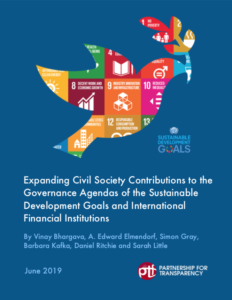
The report is a resource to understand the potential contribution of civil society to the sustainable development agenda and provide recommendations for how it can be realized. It examines the various roles CSOs play in improving government transparency, accountability and inclusiveness and controlling corruption, reviewing the evidence on what works and what does not. The report highlights the role that International Financial Institutions (IFIs), such as the World Bank, can play in accelerating progress towards SDG16 governance goals through the expansion of CSO led good governance programs, and it presents analysis and evidence-driven recommendations to accelerate progress.
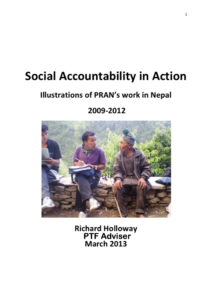
Social Accountability in Action: Illustrations of PRAN’s Work in Nepal (2009-2012)
This report reviews social accountability work of 19 CSOs working in many VDCs (Village Development Committees) in 25 very different Municipalities and Districts of Nepal, using 15 different kinds of social accountability mechanisms in three themes. The report is intended to stimulate thought about how social accountability works in practice and how the demonstration work of PRAN can be replicated and expanded to achieve the overall impact desired.
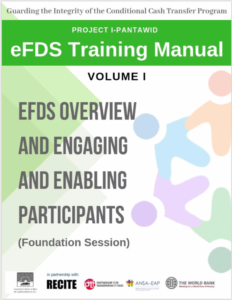
Project i-Pantawid eFDS Training Materials
Guarding the Integrity of the Conditional Cash Transfer Program (CCT) for the Philippines (i-Pantawid) aims to develop a model for civil society—government partnership for transparent and accountable implementation of the Patanwid Pamiliyang Pilipino Program.
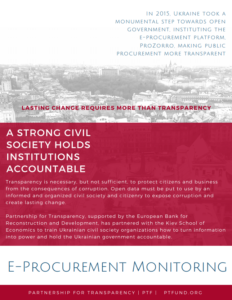
Issue Briefs: E-Procurement Monitoring in Ukraine
Transparency is necessary, but not sufficient, to protect citizens and business from the consequences of corruption. Open data must be put to use by an informed and organized civil society and citizenry to expose corruption and create lasting change. Partnership for Transparency, supported by the EBRD, has partnered with the Kiev School of Economics to train Ukrainian civil society organizations how to turn information into power and hold the Ukrainian government accountable.
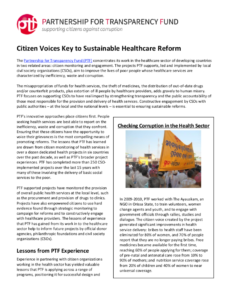
Citizen Voices Key to Sustainable Healthcare Reform
The Partnership for Transparency Fund (PTF) concentrates its work in the healthcare sector of developing countries in two related areas: citizen monitoring and engagement. The lessons that PTF has learned are drawn from citizen monitoring of health services in over a dozen dedicated health projects in six countries over the past decade, as well as PTF’s broader project experiences. PTF has completed more than 250 CSO- implemented projects over the last 15 years with many of these involving the delivery of basic social services to the poor.
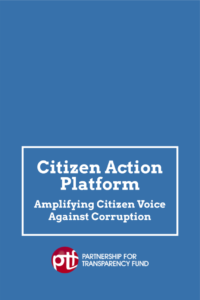
Citizen Action Platform Program Impact Report
Over the past 15 years, the Partnership for Transparency Fund has gained significant experience on what works, and what does not, in citizens’ efforts to fight corruption and improve the delivery of government services. Our most promising successes have been at the local level. As we set out to apply the lessons of this success to impact systemic corruption at the national level, it was clear that these approaches could not easily be replicated nation-wide without the use of information and communications technology (ICT). As a result, we developed the Citizen Action Platform, or CAP, to revolutionize the high-value, but high-cost of citizen reporting and monitoring of public service delivery. The program’s pilot in the Apac district of Uganda, implemented by the Anti Corruption Coalition Uganda (ACCU)and The Apac Anti Corruption Coalition (TAACC) with the support of Transparency International Uganda and UNICEF, has proven to be highly effective in reforming public health services.
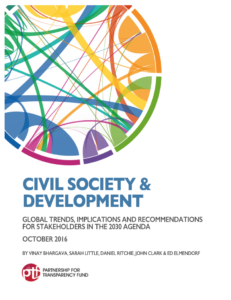
The 2030 Agenda for Sustainable Development commits all 193 UN Member States to achieving 17 Sustainable Development Goals (SDGs) through collective efforts between governments, the private sector and civil society. The 2030 Declaration specifies roles and responsibilities for civil society to play but is ambiguous on how partnership structures would be forged at the national level. A team of PTF experts have analyzed several global trends concerning civil society’s role in development and their implications for various stakeholders to build a better understanding of modalities for CSO engagement.
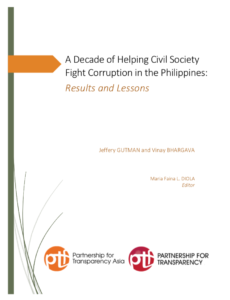
A Decade of Helping Civil Society Fight Corruption in the Philippines: Results and Lessons
This report details the results and lessons of a decade long (2003-2013) Partnership for Transparency Fund (PTF) support to Filipino civil society organizations (CSOs) to fight corruption. It celebrates the successes and reflects on challenges faced as PTF enters a new phase in the Philippines – a regional affiliate called PTF Asia as a foundation headquartered in Manila.
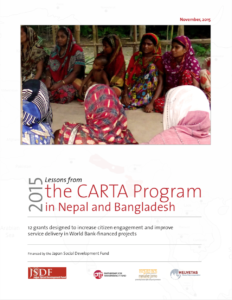
Lessons from the CARTA Program in Bangladesh and Nepal
Recent years have witnessed concerns about issues of government effectiveness and accountability, particularly in the delivery of public services. Citizen engagement is increasingly recognized as a method to help improve development program effectiveness. This report reviews the unique initiative to enhance World Bank projects by promoting CSO engagement to demand better governance and offer recommendations for future accountability programming.
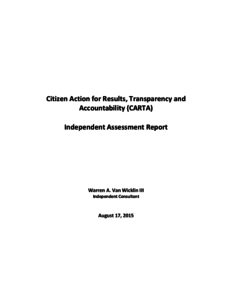
Citizen Action for Results, Transparency and Accountability (CARTA) Independent Assessment Report
The Citizen Action for Results, Transparency and Accountability (CARTA) Program was funded by a US$1.9 million grant from the Japanese Social Development Fund (JSDF). The grant was managed by the World Bank. CARTA started in mid-2011 and will be completed by November 30, 2015 after it was extended by more than one year. The World Bank chose the Partnership for Transparency Fund (PTF) to implement the CARTA Program. The CARTA Program objective was “to enhance the development impact, sustainability and client ownership of pro-poor projects financed by the World Bank in Bangladesh and Nepal, by promoting civil society organizations’ engagement, experience and capacity to demand better governance.”
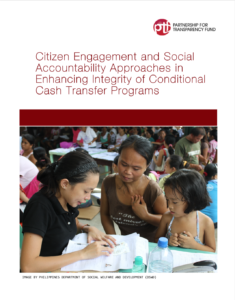
Conditional cash transfer programs (CCTPs) are widely used in the world and are proving effective in generating proven poverty alleviation impacts. However, CCTP achievements are undermined by fraud, errors, and corruption. These integrity risks and international experiences in managing them by using both state and civil society-led efforts have been analyzed in a paper prepared by PTF as part of Guarding the Integrity of the Conditional Cash Transfer Program (CCTP) in the Philippines, implemented by the Concerned Citizens of Abra for Good Government (CCAGG) and funded by the Global Partnership for Social Accountability (GPSA).
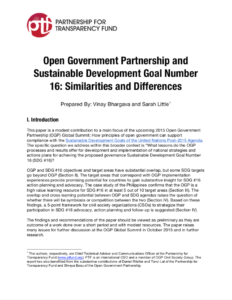
This paper is a modest contribution to a main focus of the upcoming 2015 Open Government Partnership (OGP) Global Summit: How principles of open government can support compliance with the Sustainable Development Goals of the United Nations Post-2015 Agenda. The specific question we address within this broader context is “What lessons do the OGP processes and results offer for development and implementation of national strategies and actions plans for achieving the proposed governance Sustainable Development Goal Number 16 (SDG16)?”
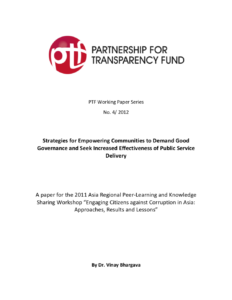
This paper provides readers with the basic idea of how demand for good governance (DFGG) strategies, in particular social accountability (SA) strategies, can be employed to help citizens demand greater authority responsiveness and thereby enhance their living conditions.
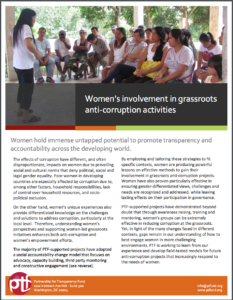
Women’s Involvement in Grassroots Anti Corruption Activities
The effects of corruption have different, and often disproportionate, impacts on women due to prevailing social and cultural norms that deny political, social and legal gender equality. Poor women in developing countries are especially affected by corruption due to, among other factors, household responsibilities, lack of control over household resources, and socio- political exclusion. On the other hand, women’s unique experiences also provide differentiated knowledge on the challenges and solutions to address corruption, particularly at the local level. Therefore, understanding women’s perspectives and supporting women-led grassroots initiatives enhances both anti-corruption and women’s empowerment efforts.
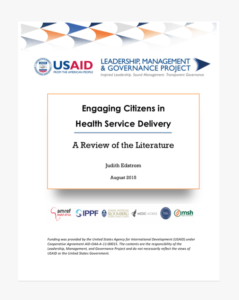
Engaging Citizens in Health Service Delivery
This report summarizes the current findings on citizen engagement instruments and examines whether these interventions have contributed to enhanced health practices and ultimately on improved health outcomes. The publication was produced by PTF Adviser, Judith Edstrom, under USAID’s Leadership, Management, and Governance Project, a USAID-funded program to collaborate with health leaders and policy makers being Implemented by a consortium led by Management Sciences for Health (MSH).
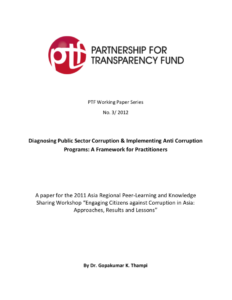
This paper introduces an analytical framework to consider the overall environment and strategic parameters that underlie a specific instance of corruption so as to logically and specifically tailor their project towards achieving the best impact possible.
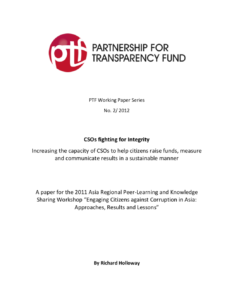
CSOs often struggle to balance their vision and declared goals with the necessary financial security to carry out activities as needed over a prolonged period of time. This paper provides a checklist for CSOs to self-evaluate their actions, aspirations and assumptions against common problems encountered and offers entry points to think about sustainability.
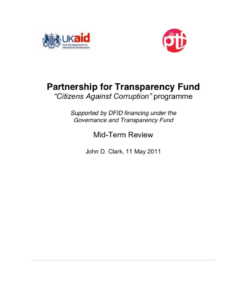
DFID Review of PTF: Innovative Support to Civil Society in Fighting Corruption
The UK’s Department for International Development has released a mid-term review of PTF’s Citizens Against Corruption (CAC) programme, which is supported by DfID’s Governance and Transparency Fund (GTF). The report stated that PTF “is able to point to specific reforms triggered by the projects. This is partly due to the very specific problems targeted and the careful guidance offered, but partly also because PTF emphasizes “constructive engagement” – hence structured and non-confrontational dialogue with officials is integral to the approach. Through this, “reform champions” have emerged who have helped secure the beneficial changes.”
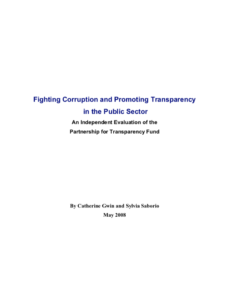
This 2008 evaluation by Catherine Gwin & Sylvia Soborio finds that PTF is a highly valuable and effective mechanism for support of small-scale civil society efforts to fight corruption and promote greater transparency and accountability in government. As an international NGO, it is well placed to provide support that is independent of vested political interests and not subject to political pressure. Through the use of unusually small grants, it has helped civil society organizations to innovate and do projects that they may not have been able to do before, and thereby enhances their experience, their visibility, and their voice. Some 25 of the 29 projects examined for this review achieved all or most of their objectives, which amounts to a success rate of 86 percent.
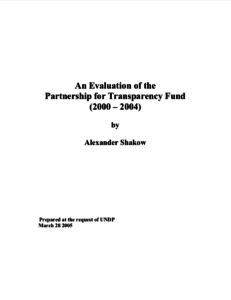
An Evaluation of the Partnership for Transparency Fund (2000 – 2004)
This report prepared at the request of UNDP by Alexander Shakow suggests that PTF is an extremely valuable and effective instrument for support of small but important anti-corruption projects.
Reports/Insights from PTF Projects
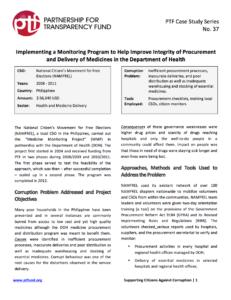
The National Citizen’s Movement for Free Elections (NAMFREL), a local CSO in the Philippines, carried out the “Medicine Monitoring Project” (MMP) in partnership with the Department of Health (DOH). The project first started in 2004 and received funding from PTF in two phases during 2008/2009 and 2010/2011. The first phase served to test the feasibility of the approach, which was then – after successful completion – scaled up in a second phase. The program was completed in 2012.
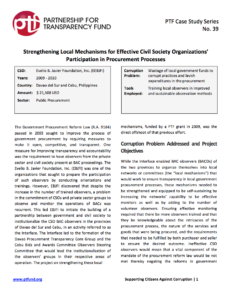
The Government Procurement Reform Law (R.A. 9184) passed in 2003 sought to improve the process of government procurement by requiring measures to make it open, competitive, and transparent. One measure for improving transparency and accountability was the requirement to have observers from the private sector and civil society present at BAC proceedings. The Evelio B. Javier Foundation, Inc. (EBJFI) was one of the organizations that sought to prepare the participation of such observers by conducting orientations and trainings. However, EBJFI discovered that despite the increase in the number of trained observers, a problem in the commitment of CSOs and private sector groups to observe and monitor the operations of BACs was recurrent. This led EBJFI to initiate the building of a partnership between government and civil society to institutionalize the CSO BAC observers in the provinces of Davao del Sur and Cebu, in an activity referred to as the Interface. The Interface led to the formation of the Davao Procurement Transparency Core Group and the Cebu Bids and Awards Committee Observers Steering Committee that would lead the institutionalization of the observers’ groups in their respective areas of operation. The project on strengthening these local mechanisms, funded by a PTF grant in 2009, was the direct offshoot of that previous effort.
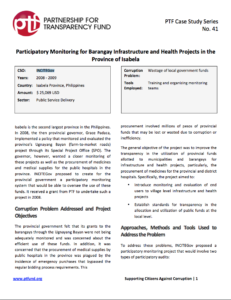
Participatory Monitoring for Barangay Infrastructure and Health Projects in the Province of Isabela
Isabela is the second largest province in the Philippines. In 2008, the then provincial governor, Grace Padaca, implemented a policy that monitored and evaluated the province’s Ugnayang Bayan (farm-to-market roads) project through its Special Project Office (SPO). The governor, however, wanted a closer monitoring of these projects as well as the procurement of medicines and medical supplies for the public hospitals in the province. INCITEGov proposed to create for the provincial government a participatory monitoring system that would be able to oversee the use of these funds. It received a grant from PTF to undertake such a project in 2008.
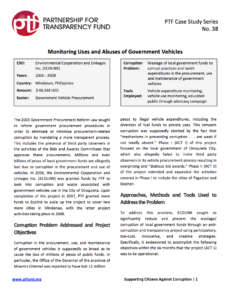
Monitoring Uses and Abuses of Government Vehicles
The 2003 Government Procurement Reform Law sought to reform government procurement procedures in order to eliminate or minimize procurement-related corruption by mandating a more transparent process. This includes the presence of third party observers in the activities of the Bids and Awards Committees that approves these procurements. Millions and even billions of pesos of local government funds are allegedly lost due to corruption in the procurement and use of vehicles. In 2006, the Environmental Cooperation and Linkages Inc. (ECOLINK) was granted funds by PTF to look into corruption and waste associated with government vehicles use in the City of Oroquieta. Upon completion of the project in 2007, PTF granted more funds to Ecolink to scale up the project to cover two more cities in Mindanao, with the latter project activities taking place in 2008.
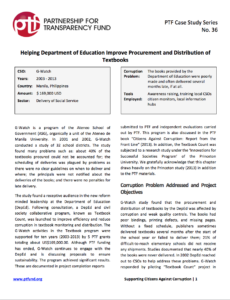
Helping Department of Education Improve Procurement and Distribution of Textbooks
G-Watch is a program of the Ateneo School of Government (ASG), organically a unit of the Ateneo de Manila University. In 2001 and 2002, G-Watch conducted a study of 32 school districts. The study found many problems such as: about 40% of the textbooks procured could not be accounted for; the scheduling of deliveries was plagued by problems as there were no clear guidelines on when to deliver and where; the principals were not notified about the deliveries of the books; and there were no penalties for late delivery.
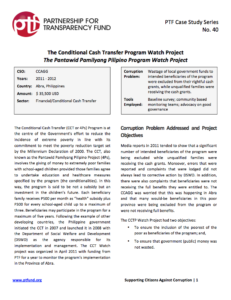
The Conditional Cash Transfer Program Watch Project
The Conditional Cash Transfer (CCT or 4Ps) Program is at the centre of the Government’s effort to reduce the incidence of extreme poverty in line with its commitment to meet the poverty reduction target set by the Millennium Declaration of 2000. The CCT, also known as the Pantawid Pamilyang Pilipino Project (4Ps), involves the giving of money to extremely poor families with school-aged children provided those families agree to undertake education and healthcare measures specified by the program (the conditionalities). In this way, the program is said to be not a subsidy but an investment in the children’s future. Each beneficiary family receives P500 per month as “health” subsidy plus P300 for every school-aged child up to a maximum of three. Beneficiaries may participate in the program for a maximum of five years. Following the example of other developing countries, the Philippine government initiated the CCT in 2007 and launched it in 2008 with the Department of Social Welfare and Development (DSWD) as the agency responsible for its implementation and management. The CCT Watch project was organized in April 2011 with funding from PTF for a year to monitor the program’s implementation in the Province of Abra.
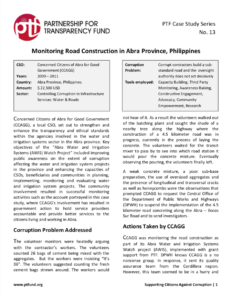
Monitoring Road Construction in Abra Province, Philippines
Concerned Citizens of Abra for Good Government (CCAGG), a local CSO, set out to strengthen and enhance the transparency and ethical standards within the agencies involved in the water and irrigation systems sector in the Abra province. Key objectives of the “Abra Water and Irrigation Systems (AWIS) Watch Project” included improving public awareness on the extent of corruption affecting the water and irrigation system projects in the province and enhancing the capacities of CSOs, beneficiaries and communities in planning, implementing, monitoring and evaluating water and irrigation system projects. The community involvement resulted in successful monitoring activities such as the account portrayed in this case study, where CCAGG’s involvement has resulted in government action to hold service providers accountable and provide better services to the citizens living and working in Abra.
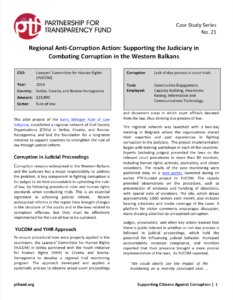
This pilot project of the Barry Metzger Rule of Law Initiative established a regional network of Civil Society Organizations (CSOs) in Serbia, Croatia, and Bosnia-Herzegovina, and laid the foundation for a long-term initiative to support countries to strengthen the rule of law through judicial reform.
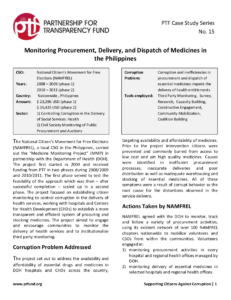
Monitoring Procurement, Delivery, and Dispatch of Medicines in the Philippines
The National Citizen’s Movement for Free Elections (NAMFREL), a local CSO in the Philippines, carried out the “Medicine Monitoring Project” (MMP) in partnership with the Department of Health (DOH). The project first started in 2004 and received funding from PTF in two phases during 2008/2009 and 2010/2011. The first phase served to test the feasibility of the approach which was then – after successful completion – scaled up in a second phase. The project focused on establishing citizen monitoring to control corruption in the delivery of health services, working with hospitals and Centers for Health Development (CHDs) to establish a more transparent and efficient system of procuring and stocking medicines. The project aimed to engage and encourage communities to monitor the delivery of health services and to institutionalize third party monitoring.
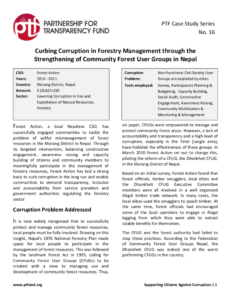
Forest Action, a local Nepalese CSO, has successfully engaged communities to tackle the problem of willful mismanagement of forest resources in the Morang District in Nepal. Through its targeted intervention, balancing constructive engagement, awareness raising and capacity building of citizens and community members to meaningfully participate in the management of forestry resources, Forest Action has laid a strong basis to curb corruption in the long run and enable communities to demand transparency, inclusion and accountability from service providers and government authorities regulating the forestry sector.
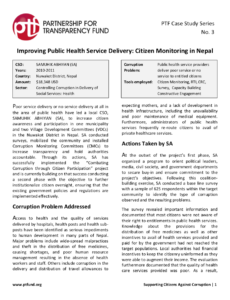
Improving Public Health Service Delivery: Citizen Monitoring in Nepal
Poor service delivery or no service delivery at all in the area of public health have led a local CSO, SAMUHIK ABHIYAN (SA), to increase citizen awareness and participation in one municipality and two Village Development Committees (VDCs) in the Nuwakot District in Nepal. SA conducted surveys, mobilized the community and installed Corruption Monitoring Committees (CMCs) to increase transparency and hold authorities accountable. Through its actions, SA has successfully implemented the “Combating Corruption through Citizen Participation” project and is currently building on that success conducting a second phase with the objective to further institutionalize citizen oversight, ensuring that the existing government policies and regulations are implemented effectively.
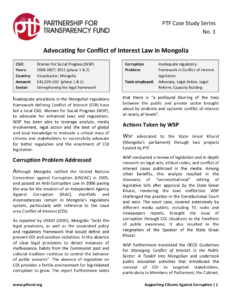
Advocating for Conflict of Interest Law in Mongolia
Inadequate provisions in the Mongolian regulatory framework defining Conflict of Interest (COI) have led a local CSO, Women for Social Progress (WSP), to advocate for enhanced laws and regulations. WSP has been able to leverage analysis, media involvement, legal action and the best of global and local knowledge to motivate a critical mass of citizens and stakeholders to successfully advocate for better regulation and the enactment of COI legislation.
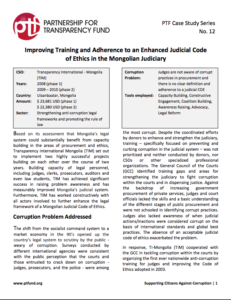
Improving Training and Adherence to an Enhanced Judicial Code of Ethics in the Mongolian Judiciary
Based on its assessment that Mongolia’s legal system could substantially benefit from capacity building in the areas of procurement and ethics, Transparency International Mongolia (TIM) set out to implement two highly successful projects building on each other over the course of two years. Building capacity of legal personnel, including judges, clerks, prosecutors, auditors and even law students, TIM has achieved significant success in raising problem awareness and has measurably improved Mongolia’s judicial system. Furthermore, TIM has worked constructively with all actors involved to further enhance the legal framework of a Mongolian Judicial Code of Ethics.
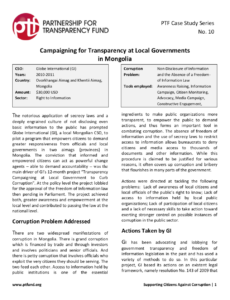
Campaigning for Transparency at Local Governments in Mongolia
The notorious application of secrecy laws and a deeply engrained culture of not disclosing even basic information to the public has prompted Globe International (GI), a local Mongolian CSO, to pilot a program that empowers citizens to demand greater responsiveness from officials and local governments in two aimags (provinces) in Mongolia. The conviction that informed and empowered citizens can act as powerful change agents – able to demand accountability – was the main driver of GI’s 12-month project “Transparency Campaigning at Local Government to Curb Corruption”. At the policy level the project lobbied for the approval of the Freedom of Information law then pending in Parliament. The project achieved both, greater awareness and empowerment at the local level and contributed to passing the law at the national level.
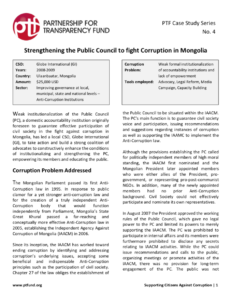
Strengthening the Public Council to Fight Corruption in Mongolia
Weak institutionalization of the Public Council (PC), a domestic accountability institution originally foreseen to guarantee effective participation of civil society in the fight against corruption in Mongolia, has led a local CSO, Globe International (GI), to take action and build a strong coalition of advocates to constructively enhance the conditions of institutionalizing and strengthening the PC, empowering its members and educating the public.
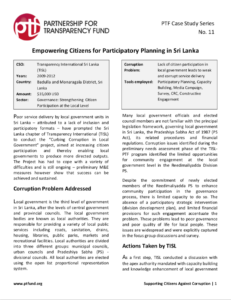
Empowering Citizens for Participatory Planning in Sri Lanka
Poor service delivery by local government units in Sri Lanka – attributed to a lack of inclusion and participatory formats – have prompted the Sri Lanka chapter of Transparency International (TISL) to conduct the “Curbing Corruption in Local Government” project, aimed at increasing citizen participation and thereby enabling local governments to produce more directed outputs. The Project has had to cope with a variety of difficulties and is still ongoing – preliminary M&E measures however show that success can be achieved and sustained.
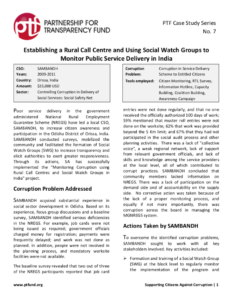
Poor service delivery in the government administered National Rural Employment Guarantee Scheme (NREGS) have led a local CSO, SAMBANDH, to increase citizen awareness and participation in the Odisha District of Orissa, India. SAMBANDH conducted surveys, mobilized the community and facilitated the formation of Social Watch Groups (SWG) to increase transparency and elicit authorities to exert greater responsiveness. Through its actions, SA has successfully implemented the “Monitoring Corruption using Rural Call Centres and Social Watch Groups in India” project
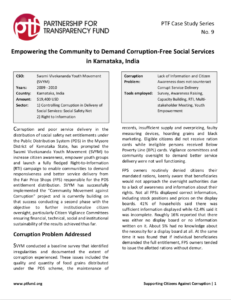
Empowering the Community to Demand Corruption-Free Social Services in Karnataka, India
Corruption and poor service delivery in the distribution of social safety net entitlements under the Public Distribution System (PDS) in the Mysore District of Karnataka State, has prompted the Swami Vivekananda Youth Movement (SVYM) to increase citizen awareness, empower youth groups and launch a fully fledged Right-to-Information (RTI) campaign to enable communities to demand responsiveness and better service delivery from the Fair Price Shops (FPS) responsible for the PDS entitlement distribution. SVYM has successfully implemented the “Community Movement against Corruption” project and is currently building on that success conducting a second phase with the objective to further institutionalize citizen oversight, particularly Citizen Vigilance Committees ensuring financial, technical, social and institutional sustainability of the results achieved thus far.
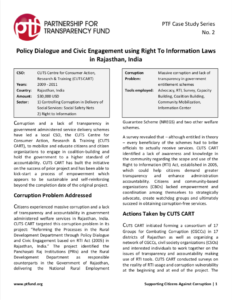
Policy Dialogue and Civic Engagement Using Right To Information Laws in Rajasthan, India
Corruption and a lack of transparency in government administered service delivery schemes have led a local CSO, the CUTS Centre for Consumer Action, Research & Training (CUTS CART), to mobilize and educate citizens and citizen organizations to engage in coalition-building and hold the government to a higher standard of accountability. CUTS CART has built the initiative on the success of prior project and has been able to kick-start a process of empowerment which appears to be sustainable and self-reinforcing beyond the completion date of the original project.
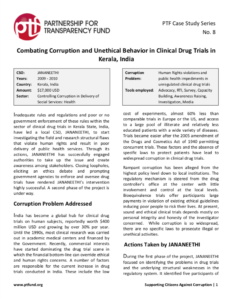
Combating Corruption and Unethical Behavior in Clinical Drug Trials in Kerala, India
Inadequate rules and regulations and poor or no government enforcement of these rules within the sector of clinical drug trials in Kerala State, India, have led a local CSO, JANANEETHI, to start investigating the field and research structural flaws that violate human rights and result in poor delivery of public health services. Through its actions, JANANEETHI has successfully engaged authorities to take up the issue and create awareness among stakeholders. Closing loopholes, eliciting an ethics debate and prompting government agencies to enforce and oversee drug trials have rendered JANANEETHI’s intervention highly successful. A second phase of the project is under way.
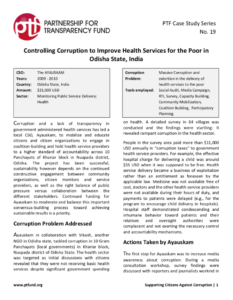
Controlling Corruption to Improve Health Services for the Poor in Odisha State, India
Corruption and a lack of transparency in government administered health services has led a local CSO, Ayauskam, to mobilize and educate citizens and citizen organizations to engage in coalition-building and hold health service providers to a higher standard of accountability across 10 Panchayats of Khariar block in Nuapada district, Odisha. The project has been successful; sustainability however depends on the continued constructive engagement between community organizations, citizen monitors and service providers, as well as the right balance of public pressure versus collaboration between the different stakeholders. Continued funding for Ayauskam to moderate and balance this important consensus-building process toward achieving sustainable results is a priority.
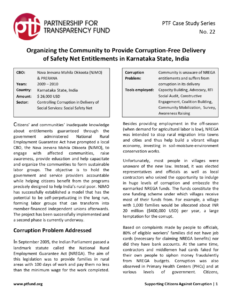
Citizens’ and communities’ inadequate knowledge about entitlements guaranteed through the government administered National Rural Employment Guarantee Act have prompted a local CBO, the Nava Jeevana Mahila Okkoota (NJMO), to engage with affected communities, raise awareness, provide education and help capacitate and organize the communities to form sustainable labor groups. The objective is to hold the government and service providers accountable while helping citizens benefit from the programs precisely designed to help India’s rural poor. NJMO has successfully established a model that has the potential to be self-perpetuating in the long run, forming labor groups that can transform into member-financed independent unions afterwards. The project has been successfully implemented and a second phase is currently underway.
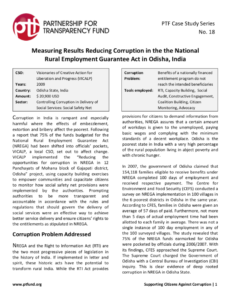
Corruption in India is rampant and especially harmful where the effects of embezzlement, extortion and bribery affect the poorest. Following a report that 75% of the funds budgeted for the National Rural Employment Guarantee Act (NREGA) had been shifted into officials’ pockets, VICALP, a local CSO, set out to affect change. VICALP implemented the “Reducing the opportunities for corruption in NREGA in 12 Panchayats of Mohana block of Gajapati district, Odisha” project, using capacity building exercises to empower communities and capacitate citizens to monitor how social safety net provisions were implemented by the authorities. Prompting authorities to be more transparent and accountable in accordance with the rules and regulations that should govern the delivery of social services were an effective way to achieve better service delivery and ensure citizens’ rights to the entitlements as stipulated in NREGA.
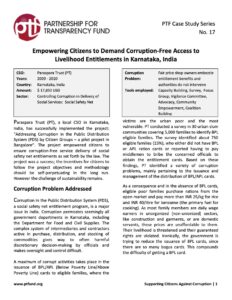
Empowering Citizens to Demand Corruption-Free Access to Livelihood Entitlements in Karnataka, India
Paraspara Trust (PT), a local CSO in Karnataka, India, has successfully implemented the project: “Addressing Corruption in the Public Distribution System (PDS) by Citizen Groups – a pilot project in Bangalore”. The project empowered citizens to ensure corruption-free service delivery of social safety net entitlements as set forth by the law. The project was a success; the incentives for citizens to follow the project objectives and methodology should be self-perpetuating in the long run. However the challenge of sustainability remains.
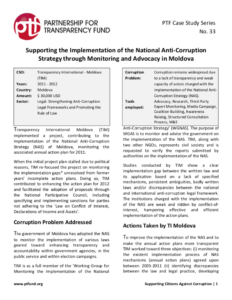
Transparency International Moldova (TIM) implemented a project, contributing to the implementation of the National Anti-Corruption Strategy (NAS) of Moldova, monitoring the associated annual action plan for 2011.
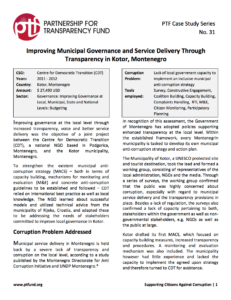
Improving Municipal Governance and Service Delivery Through Transparency in Kotor, Montenegro
Improving governance at the local level through increased transparency, voice and better service delivery was the objective of a joint project between the Centre for Democratic Transition (CDT), a national NGO based in Podgorica, Montenegro, and the Kotor municipality, Montenegro.
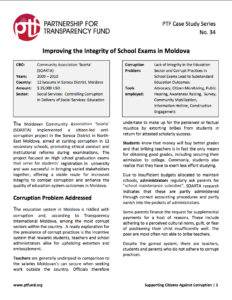
Improving the Integrity of School Exams in Moldova
The Moldovan Community Association ‘Soarta’ (SOARTA) implemented a citizen-led anticorruption project in the Soroca District in northeast Moldova, aimed at curbing corruption in 12 secondary schools, promoting ethical conduct and institutional reforms during examinations. The project focused on High school graduation exams that serve for students’ registration in university and was successful in bringing varied stakeholders together, offering a viable route for increased integrity to combat corruption and enhance the quality of education system outcomes in Moldova
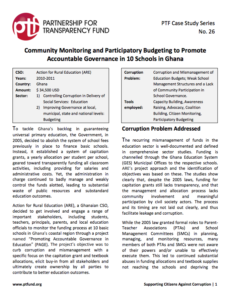
To tackle Ghana’s backlog in guaranteeing universal primary education, the Government, in 2005, decided to abolish the system of school fees previously in place to finance basic schools. Instead, it established a system of capitation grants, a yearly allocation per student per school, geared toward transparently funding all classroom activities, including providing for salaries and administrative costs. Yet, the administration in charge continued to badly manage and weakly control the funds alotted, leading to substantial waste of public resources and substandard education outcomes.
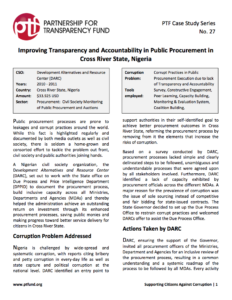
Improving Transparency and Accountability in Public Procurement in Cross River State, Nigeria
Public procurement processes are prone to leakages and corrupt practices around the world. While this fact is highlighted regularly and documented by both media outlets as well as civil society, there is seldom a home-grown and consorted effort to tackle the problem out front, civil society and public authorities joining hands.
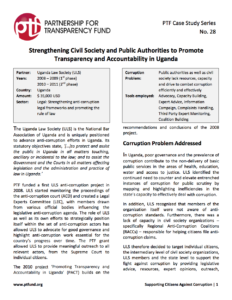
The Uganda Law Society (ULS) is the National Bar Association of Uganda and is uniquely positioned to advance anti-corruption efforts in Uganda. Its statutory objectives state, ‘[…]to protect and assist the public in Uganda in all matters touching, ancillary or incidental to the law; and to assist the Government and the Courts in all matters affecting legislation and the administration and practice of law in Uganda.’
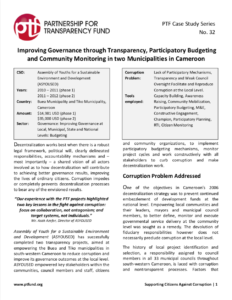
Decentralization works best when there is a robust legal framework, political will, clearly delineated responsibilities, accountability mechanisms and – most importantly – a shared vision of all actors involved as to how decentralization will contribute to achieving better governance results, improving the lives of ordinary citizens. Corruption impedes or completely prevents decentralization processes to bear any of the envisioned results.
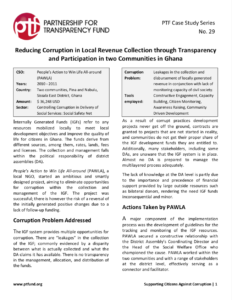
Internally Generated Funds (IGFs) refer to any resources mobilized locally to meet local development objectives and improve the quality of life for citizens in Ghana. The funds derive from different sources, among them, rates, lands, fees and licenses. The collection and management falls within the political responsibility of district assemblies (DA).
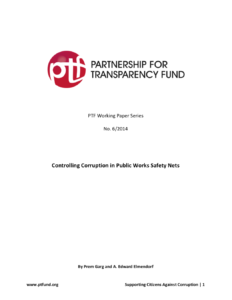
Controlling Corruption in Public Works Safety Nets
Many governments support publically-funded rural works programs to provide safety nets for the rural poor and to deploy the underused labor productively. It is estimated that developing countries spend over 10 billion dollars a year on such programs aiming to benefit over 100 million poor. Because of their decentralized nature with activities scattered over thousands of often remote work sites and with most potential beneficiaries not used to dealing with government bureaucracies, fraud and corruption are often a major risk in such programs.
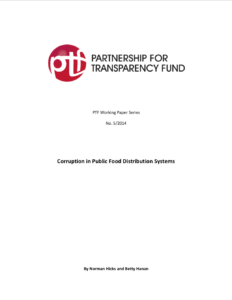
Corruption in Food Distribution Systems
Since 2009, PTF has financed eight projects with grants totaling $202,000, for projects operated by 4 CSOs in India designed to reduce corruption in PDS (Public Food Distribution Systems). A number of lessons learned from these projects are drawn out and recommendations for future action are provided.
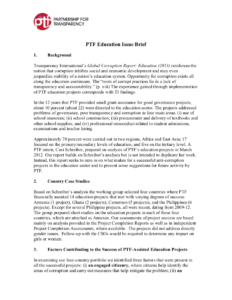
Transparency International’s Global Corruption Report: Education (2013) reinforces the notion that corruption inhibits social and economic development and may even jeopardize stability of a nation’s education system. Opportunity for corruption exists all along the education continuum. The “roots of corrupt practices lie in a lack of transparency and accountability.” (p. xiii) The experience gained through implementation of PTF education projects corresponds with TI findings.
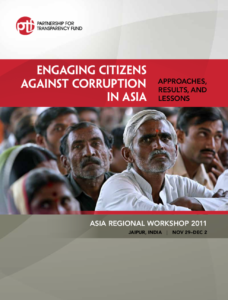
Engaging Citizens against Corruption in Asia: Approaches, Results, and Lessons
The report summarizes the combined wisdom of civil society organizations, citizens and anti-corruption experts, engaging in the fight against corruption in Asia. It details the workshop proceedings of the PTF-sponsored 2011 Asia Regional Workshop and provides practitioner-relevant expert advice, case studies and presentations that will help CSOs around the world create an even greater impact. CSOs identified “constructive engagement with authorities”, “innovative use of media” and “political economy analysis” as the most salient challenges to resolve, bringing their work to the next level.
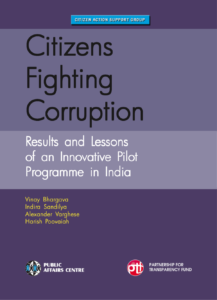
Citizens Fighting Corruption: Results and Lessons of an Innovative Pilot Program in India
This report analyzes projects pursued by 14 civil society organizations (CSOs) working in four diverse Indian states in India (Odisha, Karnataka, Rajasthan and Uttarkhand) and covering more than 1000 villages.
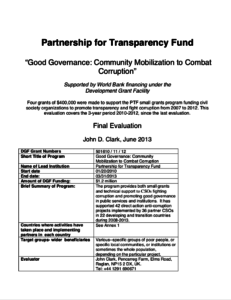
Evaluation of “Good Governance: Community Mobilization to Combat Corruption” Program
John Clark, an international development consultant, former civil society activist and adviser to former UN Secretary-General Kofi Annan, was commissioned by the UK’s Department for International Development (DFID), and by the World Bank to evaluate PTF supported projects supported by our “Citizens Against Corruption” and “Good Governance: Community Mobilization to Combat Corruption” programs. PTF projects are assessed in terms of their effectiveness and impact, their sustainability, their replicability, their innovative approaches, and whether they truly represented value for money. In each area the reports find substantial accomplishments.
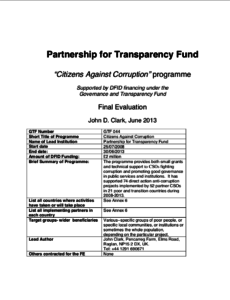
Evaluation of “Citizens Against Corruption” Program
John Clark, an international development consultant, former civil society activist and adviser to former UN Secretary-General Kofi Annan, was commissioned by the UK’s Department for International Development (DFID), and by the World Bank to evaluate PTF supported projects supported by our “Citizens Against Corruption” and “Good Governance: Community Mobilization to Combat Corruption” programs. PTF projects are assessed in terms of their effectiveness and impact, their sustainability, their replicability, their innovative approaches, and whether they truly represented value for money. In each area the reports find substantial accomplishments.
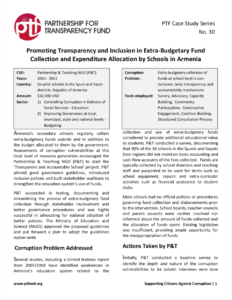
This Case Study Reviews a project implemented by the Partnership & Teaching NGO (P&T) which succeeded in testing, documenting and streamlining the process of extra-budgetary fund collection through stakeholder involvement and better governance procedures and was highly successful in advocating for national adoption of better policies.
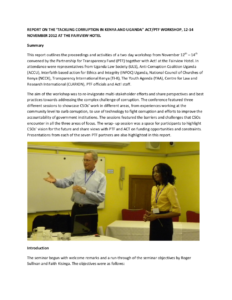
“Tackling Corruption in Kenya and Uganda” Seminar Report
This report outlines the proceedings and activities of a two day workshop from November 12 – 14, 2012, convened by PTF together with local Kenyan civil society organization, ACT. The aim of the workshop was to bring together Ugandan and Kenyan CSOs, re-invigorate multi-stakeholder efforts and share perspectives and best practices towards addressing the complex challenge of corruption. The conference featured three different sessions to showcase CSOs’ work in different areas, from experiences working at the community level to curb corruption, to use of technology to fight corruption and efforts to improve the accountability of government institutions.
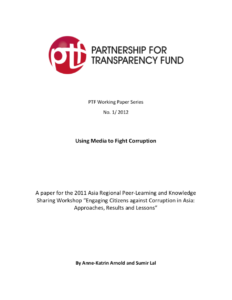
Using Media to Fight Corruption
The media—traditional mass media as well as new technologies—can play a vital role in unveiling corruption, framing corruption as public problem, suggesting solutions, and generally empower citizens to fight corruption. This paper provides an overview of the basic principles of media effects and presents specific techniques involving the media in the fight against corruption.
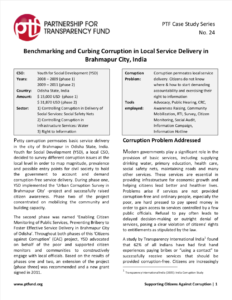
Benchmarking and Curbing Corruption in Local Service Delivery in Brahmapur City, India
This Case Study reviews a project implemented by Youth for Social Development (YSD) to survey different corruption issues at the local level in order to map magnitude, prevalence and possible entry points for civil society to hold the government to account and demand corruption-free service delivery. YSD also advocated on behalf of the poor and supported citizen monitors and communities to constructively engage with local officials.
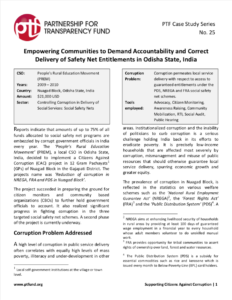
This Case Study analyzes a project implemented by the ‘People’s Rural Education Movement’ (PREM), a local CSO in Odisha State, India, that sought to reduce corruption in three social safety net programs: the National Rural Employment Guarantee Act, the Forest Rights Act and the Public Distribution System (food security).
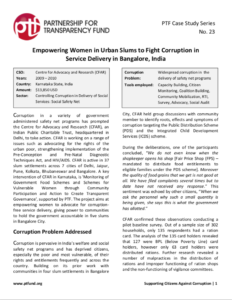
Empowering Women in Urban Slums to Fight Corruption in Service Delivery in Bangalore, India
This Case Study reviews a project implemented by the Centre for Advocacy and Research (CFAR), aimed at empowering women to advocate for corruption-free service delivery, giving power to communities to hold the government accountable in five slums in Bangalore City.
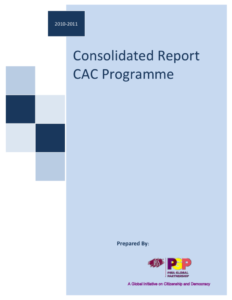
Independent Assessment of PTF’s Citizens Against Corruption (CAC) Program
PRIA Global Partnership has evaluated the performance of PTF projects in India. The report shows a comparative picture of the 12 CAC projects in the states of Karnataka, Kerala and Orissa based on the assessment of their performance at the end of the project period. Most of the projects dealt with issues of corruption in government schemes like Public Distribution System (PDS), National Rural Employment Guarantee Act (NREGA), National Rural Health Mission (NRHM), Forest Rights Act (FRA), etc. with an emphasis on promoting a more engaged and active citizenry to curb the same.


